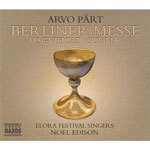
Berliner Messe / Magnificat / Summa
 $25.00
Out of Stock
$25.00
Out of Stock6+ weeks add to cart
ARVO Pa„RT
Berliner Messe / Magnificat / Summa
Elora Festival Singers / Elora Festival Orchestra / Edison (conductor)
[ Naxos / CD ]
Release Date: Sunday 10 October 2004
This item is currently out of stock. It may take 6 or more weeks to obtain from when you place your order as this is a specialist product.
Born in Paide, Estonia on 11th September 1935, Arvo Pärt studied in Tallinn with Harri Otsa and Veljo Tormis, then at the Tallinn Conservatoire with Heino Eller, graduating in 1963.
While his earliest works adopted an undemanding neo-classical style, his clandestine study of serial composition made itself apparent in Nekrolog (1960), heralding a series of scores, including Perpetuum Mobile and the First 'Polyphonic' Symphony, which afforded Pärt notoriety amid the warily-conservative establishment of the period. A growing interest in the music of Bach led Pärt to combine the famous B-A-C-H motif with often wildly extraneous material, as in the cello concerto Pro et Contra and the Second Symphony (both 1966). The climax of this period came with Credo (1968), in which Bach and Modernism openly conflict in a work whose overt Christianity was considered a direct challenge to Soviet officialdom.
Rather than pursue this line of thinking, Pärt retreated into near silence. The Third Symphony of 1971 [Naxos 8.554591] gave notice of an intense interest in early music, notably Gregorian Chant, but it was not until 1976 that he again began to compose fluently, using a tonal technique he termed tintinnabuli, in which the bell-like resonance of notes in a triad underscores a melodic voice which revolves step-wise around a central pitch. A number of works considered modern classics followed, notably Tabula Rasa [Naxos 8.554591], Fratres and Cantus in memoriam Benjamin Britten [both on Naxos 8.553750], culminating in 1982 with Pärt's largest work thus far, the St John Passion [Naxos 8.555860]. This paved the way for a sequence of mainly sacred choral works, consolidating Pärt's reputation among the most significant composers at work today. The present recording provides an overview of his mature idiom, with works written either side of the Passion, and in which a gradual expressive opening-out and harmonic enrichment of Pärt's musical vocabulary can be detected.
Tracks:
Cantate Domine Canticum Novum
Berliner Messe
De Profundis
Summa
The Beatitudes
Magnificat
